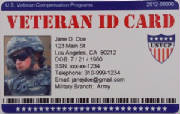|
|
|
|
|
|
IRS
Issues Scam Warning February 9, 2016
The Internal Revenue Service today warned veteran taxpayers to be on the lookout for unscrupulous tax return preparers pushing inflated tax refund claims. This scam remains on the annual list of tax scams known as the "Dirty Dozen" for the 2016 filing season. IRS Commissioner John Koskinen said, "Be wary of tax preparers that tout outlandish refunds based on VA benefits, federal benefits or tax credits you've never heard of or weren't eligible to claim in the past." Veteran taxpayers are encouraged to choose preparers who file accurate returns. Compiled annually, the "Dirty Dozen" lists a variety of common scams that taxpayers may encounter any time but many of these schemes peak during filing season as people prepare their returns or hire someone to help with their taxes.
Don't Fall Victim to Promises of Outlandish Refunds Scam artists routinely pose as tax preparers during tax time, luring veterans in by promising large federal tax refunds or refunds that most have never dreamed they were due in the first place. Scam artists use flyers, advertisements, phony store fronts and even word of mouth to throw out a wide net for victims. They may even spread the word through community groups or churches where trust is high. Scammers frequently prey on people who do not have a filing requirement, such as low-income individuals, veterans or the elderly. They also prey on non-English speakers, who may or may not have a filing requirement.
New Scam Targeting Vets and Active Duty Troops February 19, 2016
If you owe money to a debtor, be very careful. Scammers are using app technology to make their numbers appear as legitimate probate offices, and government agencies to deceive veterans and active duty troops.
The scamming operation appears to very sophisticated in nature. Using the app, the scammers will contact you using a phony telephone number that appears on your caller ID and looks legitimate. The scenario is constructed in a way that you are directed to call them back at the phony number. Naturally, they answer as fictitious agency and give the impression they are a legitimate agency doing busines as a debt collection company.
One Way to Spot A Fake Debt Collector
The Federal Trade Commission says a debt collector may be fake if they threaten you to pay them or take legal action against you if you refuse. If a “debt collector” asks you for personal financial information, do not give a mailing address or phone number.
If you feel you are speaking with a fake debt collector:
It is unclear at this time why the scammers are targeting veterans and active duty personnel.
ALERT! Firm Sued For Ripping Off Veterans Ally Senior Care rips off aging veterans by helping them get healthcare benefits, then takes the money and gives them $400 worth of housekeeping services in return, the state (California) claims in Superior Court. The Kern County district attorney on Wednesday accused Ally Care Group of elder abuse, deceptive trade and four other counts. The state also sued its CEO Michael John McWilliams, Ally Senior Care, and Senior Veterans Benefit Advocates, in Kern County Superior Court.
Scam Targeting Veterans and Active Duty Servicemembers According to news outlet, WTNH, veterans and those currently serving continue to be preyed on by dishonest solicitors trying to make money off health care future benefits and pension payments. Howard Schwartz of the Better Business Bureau said Monday that members of the military have been targets of many recent sales pitches. Schwartz said the solicitor will often offer a cash payment in exchange for a disabled veteran’s future benefits plan or pension payments. See Video.
Scam Alert Veterans and their families to be aware of rapidly popular schemes aimed at selling veterans financial products they don’t need or charging them for services which are otherwise free. These kinds of schemes, referred to as “pension poaching,” may be perpetrated by attorneys, financial planners, insurance agents or others who use misleading or incomplete information to encourage veterans to make decisions about their finances in order to qualify for benefits. Many scammers are targeting veterans in senior centers, assisted living facilities and other locations where scammers make guarantees about qualifying for benefits with a high pressure sales pitch for their products. Some unscrupulous financial planners attempt to take advantage of veterans by offering high-priced services that veterans and their families can typically obtain for free.
|
|
|
|
|
|
|

